
Scott Nearing was an American radical economist, educator, writer, political activist, pacifist, vegetarian and advocate of simple living.

The Socialist Party of America (SPA) was a socialist political party in the United States formed in 1901 by a merger between the three-year-old Social Democratic Party of America and disaffected elements of the Socialist Labor Party of America who had split from the main organization in 1899.

The first modern Farmer–Labor Party in the United States emerged in Minnesota in 1918. Economic dislocation caused by American entry into World War I put agricultural prices and workers' wages into imbalance with rapidly escalating retail prices during the war years, and farmers and workers sought to make common cause in the political sphere to redress their grievances.

The Communist Labor Party of America (CLPA) was one of the organizational predecessors of the Communist Party USA.
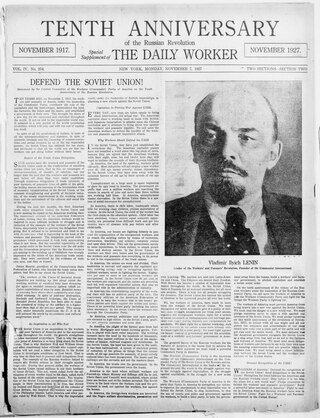
The Daily Worker was a newspaper published in New York City by the Communist Party USA, a formerly Comintern-affiliated organization. Publication began in 1924. While it generally reflected the prevailing views of the party, attempts were made to reflect a broader spectrum of left-wing opinion. At its peak, the newspaper achieved a circulation of 35,000. Contributors to its pages included Robert Minor and Fred Ellis (cartoonists), Lester Rodney, David Karr, Richard Wright, John L. Spivak, Peter Fryer, Woody Guthrie and Louis F. Budenz.

Paul Mattick Sr. was a German-American Marxist political writer and social revolutionary, whose thought can be placed within the council communist and left communist traditions.

The Proletarian Party of America (PPA) was a small communist political party in the United States, originating in 1920 and terminated in 1971. Originally an offshoot of the Communist Party of America, the group maintained an independent existence for over five decades. It is best remembered for carrying forward Charles H. Kerr & Co., the oldest publisher of Marxist books in America.

The Socialist Propaganda League of America (SPLA) was established in 1915, apparently by C. W. Fitzgerald of Beverly, Massachusetts. The group was a membership organization established within the ranks of the Socialist Party of America (SPA) and is best remembered as direct lineal antecedent of the Left Wing Section of the SPA and its governing National Council — the forerunner of the American Communist movement. It published a journal, The Internationalist, renamed The New International in 1917, last published in 1919.
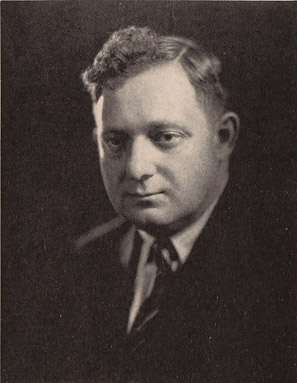
Benjamin Gitlow was a prominent American socialist politician of the early 20th century and a founding member of the Communist Party USA. During the end of the 1930s, Gitlow turned to conservatism and wrote two sensational exposés of American Communism, books which were very influential during the McCarthy period. Gitlow remained a leading anti-communist up to the time of his death.
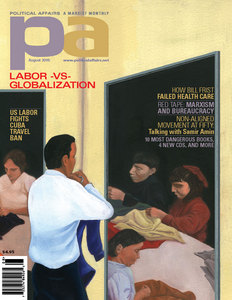
Political Affairs Magazine was a monthly Marxist publication, originally published in print and later online only. It aimed to provide an analysis of events from a working class point of view. The magazine was a publication of the Communist Party USA and was founded in 1944 upon the closure of its predecessor, The Communist, which was founded in 1927. Well-known editors of Political Affairs Magazine included V. J. Jerome, Gus Hall, Hyman Lumer, Herbert Aptheker, Gerald Horne, and Joe Sims. Other editors included Max Weiss. In 2016, the magazine stopped publishing articles and merged with People's World.
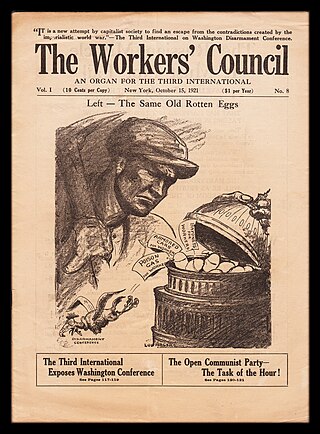
The Workers' Council of the United States, commonly known as the "Workers' Council," was a short-lived organized faction of former Socialist Party of America members seeking to affiliate with the Comintern. When that failed, it agitated for the creation of an open communist party. It was small and short-lived group, but it played an important role in the 1921 creation of the Workers Party of America. It included many individuals who would have prominent careers in radical and labor movements such as Moissaye Olgin, J. Louis Engdahl, Alexander Trachtenberg, William F. Kruse, and Melech Epstein.

James J. Oneal, a founding member of the Socialist Party of America (SPA), was a prominent socialist journalist, historian, and party activist who played a decisive role in the bitter party splits of 1919–21 and 1934–36.
The Revolutionary Communist Vanguard was a Far Left group in the United States. It broke off from the Philadelphia section of the Revolutionary Workers League. Originally known as the "Social Science Circle", it became the Revolutionary Communist Vanguard when the group made its final break with Hugo Oehler. It was "led by a lad named Fleming" and, according to Max Shachtman, had a membership of only 2 people in December 1938. The member or members of the group used a variety of inventive pseudonyms in their bulletins, i.e., Don Quickshot, Obadiah Fairfax, Robin Redbreast, Jerome Rembrandt, and Esther Paris.
The Fieldites were a small leftist sect that split from the Communist League of America in 1934 and known officially as the Organization Committee for a Revolutionary Workers Party and then the League for a Revolutionary Workers Party. The name comes from the name of its leader B. J. Field.
The United Toilers of America, established in 1922, was the legal wing of an underground Marxist group which split off from the Communist Party of America in the fall of 1921. The organization published a weekly newspaper called Workers' Challenge and was effectively dissolved at the insistence of the Communist International by the time of the Bridgman Convention of August 1922 with its members rejoining the mainline Workers Party of America. A tiny underground rump organization resisted merger and continued an independent existence throughout the decade of the 1920s.

The 1922 Bridgman Convention was a secret conclave of the underground Communist Party of America (CPA) held in August 1922 near the small town of Bridgman, Michigan, about 90 miles (140 km) outside of the city of Chicago on the banks of Lake Michigan. The convention, called by the CPA as its annual gathering for the election of officers and making of internal decisions, was attended by a delegate who was secretly an employee of the Bureau of Investigation, who informed his superiors of the date and general location of the gathering. The convention was raided by local and federal law enforcement authorities on August 22, 1922, and a number of participants and a large quantity of documents seized in an operation which garnered national headlines. Two 1923 test trials of the Michigan criminal syndicalism law resulted from the arrests, with trade union leader William Z. Foster freed by a "hung jury," while Communist Party leader C. E. Ruthenberg was convicted. Ruthenberg ultimately died of peritonitis in 1927, just after his appeals were exhausted and just before sentence was enforced. No additional trials associated with the 1922 Bridgman raid were conducted.

The Revolutionary Age was an American radical newspaper edited by Louis C. Fraina and published from November 1918 until August 1919. Originally the publication of Local Boston, Socialist Party, the paper evolved into the de facto national organ of the Left Wing Section of the Socialist Party which battled for control of the Socialist Party throughout the spring and summer of 1919. With the establishment of the Left Wing National Council in June 1919, the paper was moved from Boston to New York City gained status as the official voice of the nascent American communist movement. The publication was terminated in August 1919, replaced by the official organ of the new Communist Party of America, a weekly newspaper known as The Communist.

The Revolutionary Workers League (RWL) was a radical left group in the United States, lasting from 1935 through 1946. It was led by Hugo Oehler and published The Fighting Worker newspaper.
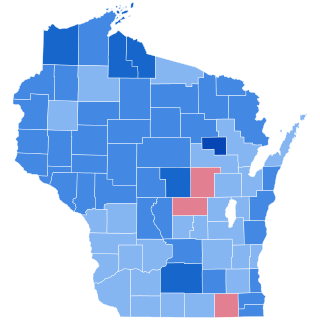
The 1964 United States presidential election in Wisconsin was held on November 3, 1964 as part of 1964 United States presidential election. State voters chose 12 electors to the Electoral College, who voted for president and vice president.
Walter Goldwater was an American antiquarian bookseller, who worked briefly at International Publishers before founding University Place Book Shop in Manhattan, part of "Book Row". He was also a co-founder and publisher of Dissent magazine and a noted tournament chess player.















